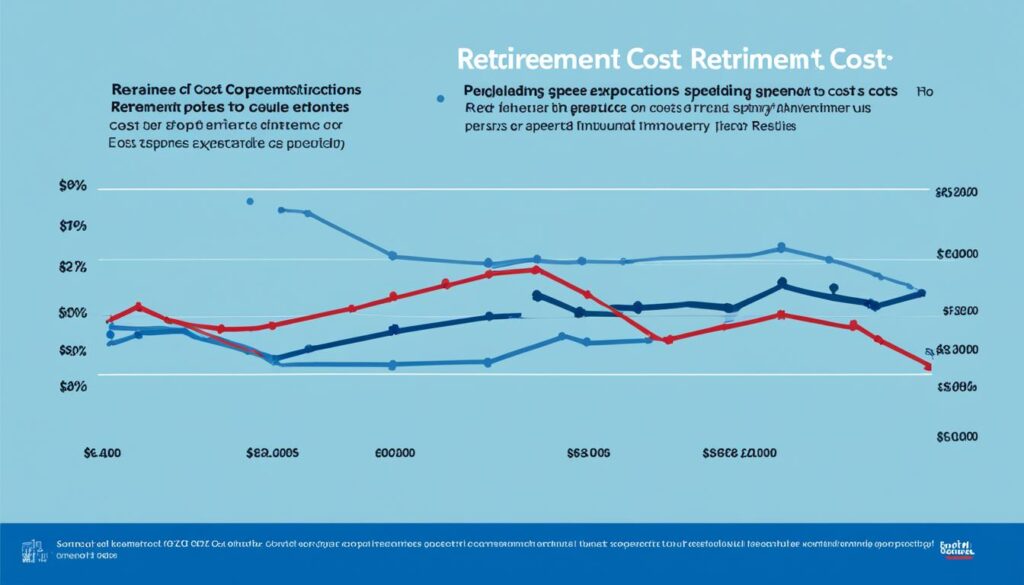Getting ready for retirement means knowing what you’ll spend money on. Many people near retirement age don’t realize how much they will really need. A study by the Nationwide Retirement Institute showed a big difference in what people expect and what retirees actually spend.
The study asked 1,000 American adults between 60 and 65 about their spending. It found that those who had already retired spent more than expected. This shows why it’s vital to plan your retirement well and to use tools that help you figure out how much you’ll really spend.
Looking at the study’s results and learning how to cut retirement costs can teach us how to handle retirement finances better.
Key Takeaways
- Retirement-age workers often underestimate the true costs of retirement
- The Nationwide Retirement Institute survey reveals a gap between expectations and reality
- Basic expenses in retirement are often higher than anticipated
- Comprehensive retirement planning is crucial for financial independence
- Strategies exist for managing and reducing retirement expenses
The Reality Gap: Expectations vs. Actual Retirement Spending
As we near retirement, knowing about the costs we’ll face is important. The Nationwide Retirement Institute surveyed 1,000 U.S. adults between 60 and 65. This survey showed the gap between what people expect to spend in retirement and the real spending.

Nationwide Retirement Institute Survey Findings
The survey found that many don’t realize how much retirement will cost. People who are still working think it will cost less. However, those who have already retired say it costs more than expected.
Disparities Between Working and Retired Respondents
Let’s delve into the differences between what workers and retirees think about expenses. Here are some key results from the survey:
| Expense Category | Working Respondents’ Expectations | Retired Respondents’ Actual Spending |
|---|---|---|
| Housing | $1,450 per month | $1,950 per month |
| Food | $500 per month | $650 per month |
| Healthcare | $300 per month | $450 per month |
| Transportation | $250 per month | $400 per month |
The survey findings stress the need to think deeply about retirement costs. Comparing these to what retirees actually spend is crucial. It helps us to prepare well for retirement. This includes making smart choices about saving and planning our financial future.
Common Retirement Expenses Often Overlooked
When nearing retirement, it’s key to think about all the possible expenses. We often don’t realize how much certain costs can impact our retirement. By knowing and planning for these overlooked expenses, we can be ready for a safe and happy retirement.

Healthcare Costs in Retirement
Healthcare costs are big and many people don’t think about them enough. As we get older, we usually need more healthcare. A study from Fidelity Investments says a 65-year-old couple retiring in 2021 might spend $300,000 on healthcare during retirement. This doesn’t include long-term care costs. It’s important to think about these costs when planning, and maybe use health savings accounts or extra insurance.
Taxes on Retirement Income
People often forget about taxes on their retirement income. They might think their taxes will go way down when they retire, but this isn’t always true. I might still pay taxes on some of my retirement money. It’s smart to talk to a financial pro about how to lower my taxes in retirement.
Inflation’s Impact on Retirement Savings
Inflation sneaks up on our savings, but it’s a big threat. Our money buys less over time as prices go up. Even a low 2-3% inflation can really change the value of our savings over 20-30 years. To fight inflation, we should invest in things that can earn more than inflation, like stocks. And we need to make sure our retirement budget can keep up with the increasing cost of living.
| Retirement Expense | Average Annual Cost | Potential Impact on Retirement Savings |
|---|---|---|
| Healthcare Costs | $12,000 per person | Reduced disposable income, increased need for savings |
| Taxes on Retirement Income | Varies based on income sources and tax bracket | Decreased net income, potential for higher tax liability |
| Inflation (2-3% annually) | Gradual increase in cost of living | Diminished purchasing power of savings over time |
Knowing and planning for these expenses can help keep me financially secure and free in my retirement years. It’s important to keep checking and updating my retirement plan. This way, I can handle my retirement expenses well and have a great retirement.
Budgeting for Leisure Activities and Travel
Planning for retirement means thinking about more than just the basics. It’s key to factor in costs for fun things and trips too. Retirement is your time to enjoy hobbies and travel. These costs can change a lot based on what you like to do and what you can afford.

Make sure to set money aside for the things that make you happy. Whether you love golf, art, learning to cook, or see new places. Having a budget for these will keep you excited in retirement.
Figuring out how much you need for fun and trips starts with a wish list. Research costs and fit them into your retirement plan. Travel can cost a lot, especially if you love going on big trips often.
According to a recent survey by the TransAmerica Center for Retirement Studies, retirees spend an average of $2,000 per year on leisure activities and $2,500 per year on travel. However, these figures can vary widely based on individual circumstances and preferences.
For help in managing costs, look at some tips:
- Set aside a part of your retirement money just for fun and travel.
- Use discounts and travel during cheaper times to save.
- Look for low-cost activities, like local trips or free events.
- If needed, think about working part-time to support your hobbies and travel.
It’s all about finding the right balance in retirement. This way, you can do what you love while staying financially secure. Plan for these expenses early on. This will help you enjoy your retirement without worry.
The Importance of Comprehensive Retirement Planning
To ensure a secure financial future, engaging in comprehensive retirement planning is key. It takes a full look at your retirement. It includes many parts that can affect your money in the future.
Assessing Your Unique Retirement Needs
The first thing in comprehensive retirement planning is to assess your unique retirement needs. Think about what you need, including your:
- Your desired lifestyle in retirement
- Potential healthcare costs
- Housing and living arrangements
- Travel and leisure activities
Knowing these needs and goals helps you make a better personal retirement plan.
Creating a Realistic Retirement Budget
Next comes making a realistic retirement budget. It should cover all your future expenses, the needs like:
| Expense Category | Examples |
|---|---|
| Basic Living Expenses | Housing, food, utilities, transportation |
| Healthcare Costs | Insurance premiums, out-of-pocket expenses, medications |
| Leisure and Travel | Hobbies, vacations, entertainment |
| Taxes | Income taxes, property taxes |
A clear budget helps you see your future financial needs and plan well.
Regularly Reviewing and Adjusting Your Plan
Comprehensive retirement planning doesn’t end after planning once. You need to keep checking and fixing your plan as things change.
Life isn’t always what we expect. Be ready to change in your planning to face anything.
Using
retirement planning tools
, like calculators and software, can keep you on the right path. They help as you
review and adjust your retirement plan
over time.
Approaching your retirement plan fully and working through your needs and budget helps. Regular checks and changes make for a better, safer, and happier retirement.
Strategies to Reduce Retirement Expenses
As I get closer to retiring, cutting costs is key for me. This way, I can keep my financial freedom. By using some smart money-saving strategies, I can make my retirement savings last longer. This means I can live more comfortably when I stop working.
One plan I have is to move to a smaller home. A smaller place means lower bills. I’ll pay less for my home, its taxes, and to keep it up. This way, I can spend more on fun and important things in retirement.
Also, I’m thinking of moving to a cheaper spot. Some places cost less to live. I will look for areas where I can save money on housing, taxes, and healthcare. It’s important to pick a place that’s not only cheap but also has things I like nearby.
“Optimizing healthcare coverage is crucial for managing retirement costs. I plan to thoroughly review my options and choose a plan that provides comprehensive coverage at a reasonable price. This may involve comparing Medicare plans, considering supplemental insurance, and exploring cost-saving strategies like using generic medications or participating in wellness programs.”
Deciding taxes wisely is another big part of cutting costs in retirement. I’ll talk to a money expert about the best way to use my retirement savings. This might mean:
- Withdrawing money from certain accounts first
- Taking all the tax breaks I can get
- Watching out for how much I must take out each year
| Retirement Expense Reduction Strategy | Potential Impact on Financial Independence |
|---|---|
| Downsizing home | Reduces housing costs, freeing up more income for other expenses |
| Relocating to a more affordable area | Lowers overall cost of living, allowing retirement savings to last longer |
| Optimizing healthcare coverage | Ensures comprehensive coverage while minimizing out-of-pocket costs |
| Making smart tax decisions | Maximizes after-tax income and preserves more wealth for retirement |
Using these strategies helps me keep control of my money later in life. By keeping an eye on my spending and staying flexible, I can make sure my money lasts. That way, I can enjoy my retirement without worrying too much about money.
Retirement Expenses: Personalized Considerations
Planning for retirement is important. Note that everyone’s retirement expenses are different. Where you live, your health, and if you need long-term care all matter. They affect how much money you’ll need to retire well.
Geographic Location and Cost of Living
Retirement costs can change a lot depending on your location. Some places are more expensive for housing, food, and healthcare. Others offer a cheaper way of life. Here’s a look at the costs in three popular retirement spots:
| City | Cost of Living Index | Median Home Price | Average Healthcare Costs |
|---|---|---|---|
| Scottsdale, AZ | 123.1 | $475,000 | $6,681 |
| Sarasota, FL | 102.6 | $315,000 | $6,381 |
| Asheville, NC | 106.3 | $295,000 | $5,911 |
As shown, where you retire significantly affects costs. It’s crucial to check living expenses in different places. This helps you match your retirement plans with your budget.
Health Status and Potential Long-Term Care Needs
Your health and long-term care needs are also key. As we get older, we might need more medical care or assisted living. Such costs can strain your finances. It’s vital to plan for them well.
A Genworth Financial study found the national median for a nursing home’s private room is $8,821 a month. This makes $105,852 a year. Even in-home care is pricey, costing $4,576 a month or $54,912 a year.
Here are some tips for dealing with health costs:
- Stay healthy to avoid major medical expenses
- Look into long-term care insurance
- Keep money from your savings for health costs
- Learn about Medicare and any extra insurance
Taking steps early can help handle future health costs and long-term care needs. It makes facing retirement’s financial side easier.
To sum up, personal retirement costs vary. They include where you live, the cost of living, your health, and future care needs. Considering these points and being thorough in your planning helps set a realistic budget. This way, you can ensure your retirement years are well-covered.
The Role of Financial Advisors in Retirement Expense Planning
Planning for retirement expenses can be a daunting task. However, a skilled financial advisor can help a lot. They have the knowledge and tools to make a detailed plan just for you.
Benefits of Working with a Professional
Working with a financial advisor has many advantages. They can show you how to grow your savings, lower your taxes, and plan for a comfortable retirement. They spot any missing pieces in your plan and offer ways to fix them. Plus, they guide you on tricky subjects like Social Security, health care, and making a will. This helps you make smart choices in line with your financial goals.
How to Find the Right Financial Advisor for You
Choosing the right financial advisor is crucial for your peace of mind. Look for someone who is an expert in retirement planning and meets your specific needs. It’s also important to decide on how they get paid – a set fee or a percentage of your investments, or by earning commissions. You should feel at ease talking to them, and they should truly listen and understand what you want.
A reliable financial advisor is like having a trusted friend by your side. They can guide you through the complexities of planning for retirement. This support is key to reaching the financial freedom you dream of in your later years.

